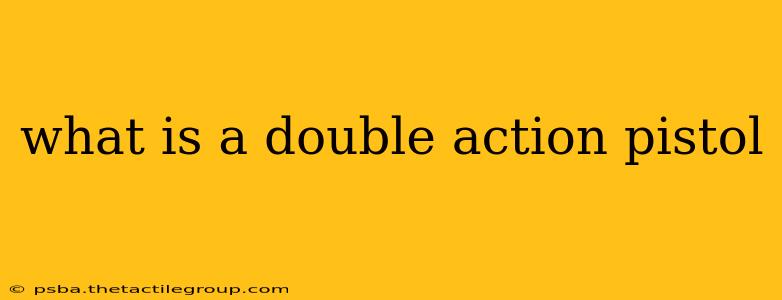Double-action pistols are a popular firearm type, known for their unique firing mechanism and versatile functionality. Understanding their mechanics and advantages is crucial for anyone interested in firearms or self-defense. This comprehensive guide will explore everything you need to know about double-action pistols, from their operating principles to their practical applications.
Understanding the Double-Action Mechanism
The term "double-action" refers to the pistol's firing mechanism. Unlike single-action pistols, which require the hammer to be manually cocked before each shot, a double-action pistol performs two actions with a single trigger pull:
- Cocking the Hammer: The first part of the trigger pull cocks the hammer, readying it to strike the firing pin.
- Releasing the Hammer: The continued pull of the trigger releases the cocked hammer, firing the cartridge.
This means each shot requires a longer, heavier trigger pull than a single-action pistol. However, this also eliminates the need to manually cock the hammer before each shot, offering a quicker and potentially more efficient method of firing, particularly in rapid succession or under stress.
Advantages of Double-Action Pistols
- Enhanced Safety: The longer, heavier trigger pull acts as a built-in safety mechanism, reducing the likelihood of accidental discharges.
- Concealed Carry: Their ability to fire directly from a holstered position without manual cocking makes them ideal for concealed carry applications.
- Versatility: They are adaptable to a range of situations, suitable for both target shooting and self-defense.
- Simplicity: Many find the double-action mechanism simpler to learn and use, especially for beginners.
Disadvantages of Double-Action Pistols
- Heavier Trigger Pull: The longer trigger pull can be a disadvantage for accuracy and speed, particularly for those unfamiliar with the mechanism.
- Potential for Misfires: In some cases, if the trigger isn't fully depressed, the firing pin might not fully strike the primer, resulting in a misfire. This is less likely in modern, well-maintained firearms.
Double-Action Only (DAO) vs. Double-Action/Single-Action (DA/SA)
It's important to distinguish between two main types of double-action pistols:
Double-Action Only (DAO) Pistols
These pistols only operate in double-action mode. Every shot requires a full double-action trigger pull. This simplifies the design and enhances safety.
Double-Action/Single-Action (DA/SA) Pistols
These pistols offer both double-action and single-action modes. The first shot is double-action, while subsequent shots are single-action, after the hammer is cocked by the first shot. This provides a lighter, faster trigger pull for follow-up shots. However, this requires more familiarity and training than a DAO pistol.
Choosing the Right Double-Action Pistol
Selecting the right double-action pistol depends on individual needs and preferences. Factors to consider include:
- Intended Use: Self-defense, target shooting, or competition?
- Caliber: Different calibers offer various levels of power and stopping power.
- Size and Weight: Comfort and concealability are crucial considerations.
- Ergonomics: The pistol should fit comfortably in your hand.
- Reliability: Choose a reputable manufacturer with a history of producing reliable firearms.
Conclusion
Double-action pistols represent a significant advancement in firearm technology, offering a balance of safety, versatility, and ease of use. Understanding the nuances of the double-action mechanism and the differences between DAO and DA/SA pistols is vital for making an informed decision when selecting a firearm. Always remember to prioritize safety and undergo proper training before handling any firearm.

